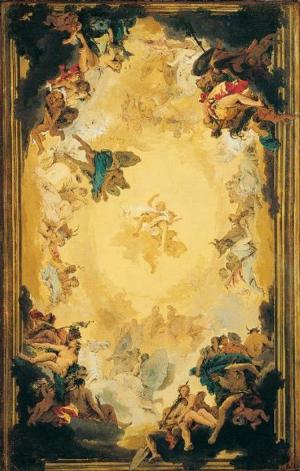The Story of Francis Cludde
Nonfiction, Religion & Spirituality, New Age, History, Fiction & Literature| Author: | Stanley John Weyman | ISBN: | 9781465524966 |
| Publisher: | Library of Alexandria | Publication: | March 8, 2015 |
| Imprint: | Language: | English |
| Author: | Stanley John Weyman |
| ISBN: | 9781465524966 |
| Publisher: | Library of Alexandria |
| Publication: | March 8, 2015 |
| Imprint: | |
| Language: | English |
HÉ, SIRE ANE, HÉ! On the boundary line between the two counties of Warwick and Worcester there is a road very famous in those parts, and called the Ridgeway. Father Carey used to say--and no better Latinist could be found for a score of miles round in the times of which I write--that it was made by the Romans. It runs north and south along the narrow spine of the country, which is spread out on either side like a map, or a picture. As you fare southward you see on your right hand the green orchards and pastures of Worcestershire stretching as far as the Malvern Hills. You have in front of you Bredon Hill, which is a wonderful hill, for if a man goes down the Avon by boat it goes with him--now before, and now behind--a whole day's journey--and then stands in the same place. And on the left hand you have the great Forest of Arden, and not much besides, except oak trees, which grow well in Warwickshire. I describe this road, firstly, because it is a notable one, and forty years ago was the only Queen's highway, to call a highway, in that country. The rest were mere horse-tracks. Secondly, because the chase wall of Coton End runs along the side of it for two good miles; and the Cluddes--I am Francis Cludde--have lived at Coton End by the Ridgeway time out of mind, probably--for the name smacks of the soil--before the Romans made the road. And thirdly, because forty years ago, on a drizzling February day in 1555--second year of Mary, old religion just reestablished--a number of people were collected on this road, forming a group of a score or more, who stood in an ordered kind of disorder about my uncle's gates and looked all one way, as if expecting an arrival, and an arrival of consequence. First, there was my uncle Sir Anthony, tall and lean. He wore his best black velvet doublet and cloak, and had put them on with an air of huge importance. This increased each time he turned, staff in hand, and surveyed his following, and as regularly gave place to a "Pshaw!" of vexation and a petulant glance when his eye rested on me. Close beside him, looking important too, but anxious and a little frightened as well, stood good Father Carey. The priest wore his silk cassock, and his lips moved from time to time without sound, as though he were trying over a Latin oration--which, indeed, was the fact. At a more respectful distance were ranged Baldwin Moor, the steward, and a dozen servants; while still farther away lounged as many ragamuffins--landless men, who swarmed about every gentleman's door in those times, and took toll of such abbey lands as the king might have given him. Against one of the stone gate-pillars I leaned myself--nineteen years and six months old, and none too wise, though well grown, and as strong as one here and there. And perched on the top of the twin post, with his chin on his knees, and his hands clasped about them, was Martin Luther, the fool. Martin had chosen this elevated position partly out of curiosity, and partly, perhaps, under a strong sense of duty. He knew that, whether he would or no, he must needs look funny up there. His nose was red, and his eyes were running, and his teeth chattering; and he did look funny. But as he felt the cold most his patience failed first. The steady, silent drizzle, the mist creeping about the stems of the oak trees, the leaden sky proved too much for him in the end. "A watched pot never boils!" he grumbled
HÉ, SIRE ANE, HÉ! On the boundary line between the two counties of Warwick and Worcester there is a road very famous in those parts, and called the Ridgeway. Father Carey used to say--and no better Latinist could be found for a score of miles round in the times of which I write--that it was made by the Romans. It runs north and south along the narrow spine of the country, which is spread out on either side like a map, or a picture. As you fare southward you see on your right hand the green orchards and pastures of Worcestershire stretching as far as the Malvern Hills. You have in front of you Bredon Hill, which is a wonderful hill, for if a man goes down the Avon by boat it goes with him--now before, and now behind--a whole day's journey--and then stands in the same place. And on the left hand you have the great Forest of Arden, and not much besides, except oak trees, which grow well in Warwickshire. I describe this road, firstly, because it is a notable one, and forty years ago was the only Queen's highway, to call a highway, in that country. The rest were mere horse-tracks. Secondly, because the chase wall of Coton End runs along the side of it for two good miles; and the Cluddes--I am Francis Cludde--have lived at Coton End by the Ridgeway time out of mind, probably--for the name smacks of the soil--before the Romans made the road. And thirdly, because forty years ago, on a drizzling February day in 1555--second year of Mary, old religion just reestablished--a number of people were collected on this road, forming a group of a score or more, who stood in an ordered kind of disorder about my uncle's gates and looked all one way, as if expecting an arrival, and an arrival of consequence. First, there was my uncle Sir Anthony, tall and lean. He wore his best black velvet doublet and cloak, and had put them on with an air of huge importance. This increased each time he turned, staff in hand, and surveyed his following, and as regularly gave place to a "Pshaw!" of vexation and a petulant glance when his eye rested on me. Close beside him, looking important too, but anxious and a little frightened as well, stood good Father Carey. The priest wore his silk cassock, and his lips moved from time to time without sound, as though he were trying over a Latin oration--which, indeed, was the fact. At a more respectful distance were ranged Baldwin Moor, the steward, and a dozen servants; while still farther away lounged as many ragamuffins--landless men, who swarmed about every gentleman's door in those times, and took toll of such abbey lands as the king might have given him. Against one of the stone gate-pillars I leaned myself--nineteen years and six months old, and none too wise, though well grown, and as strong as one here and there. And perched on the top of the twin post, with his chin on his knees, and his hands clasped about them, was Martin Luther, the fool. Martin had chosen this elevated position partly out of curiosity, and partly, perhaps, under a strong sense of duty. He knew that, whether he would or no, he must needs look funny up there. His nose was red, and his eyes were running, and his teeth chattering; and he did look funny. But as he felt the cold most his patience failed first. The steady, silent drizzle, the mist creeping about the stems of the oak trees, the leaden sky proved too much for him in the end. "A watched pot never boils!" he grumbled















